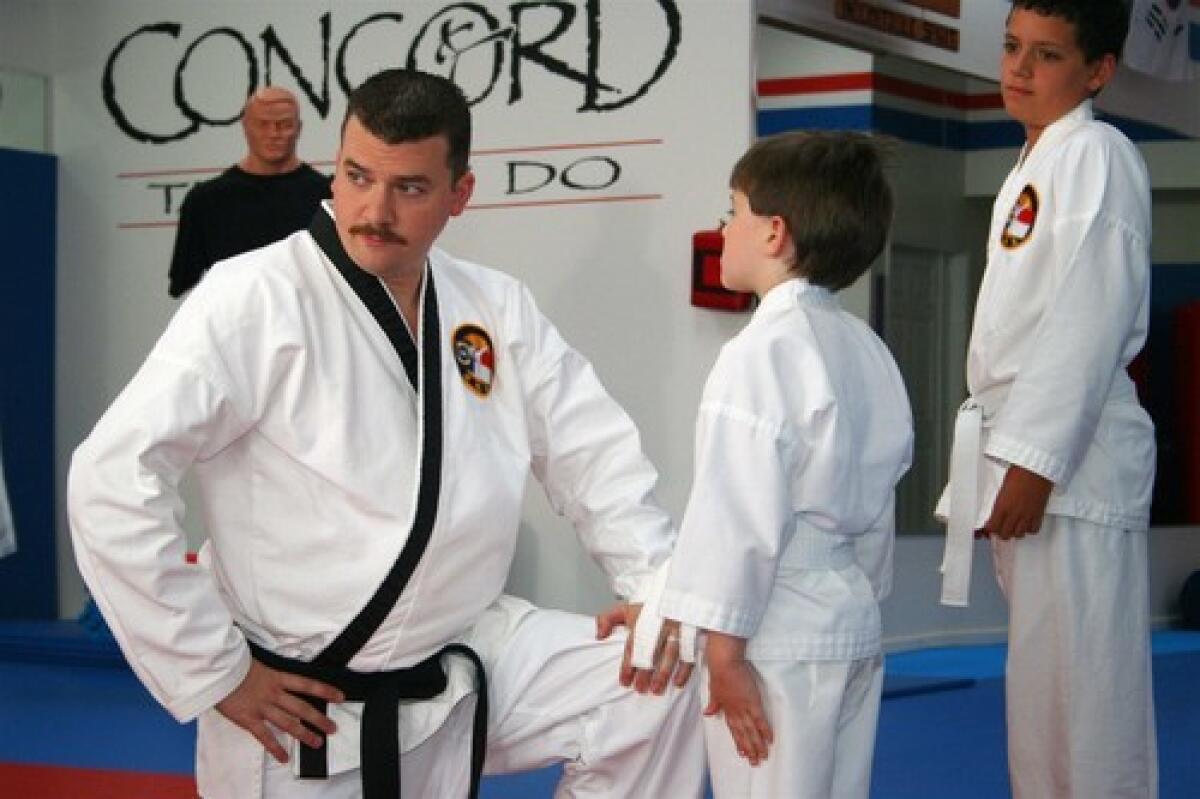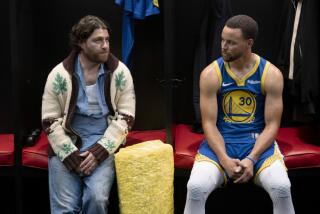The misunderstood humor of Danny McBride
- Share via
“The Righteous Gemstones,” which premieres Sunday, is the third HBO series created or co-created by and starring Danny McBride. It’s not every comic actor who can make that claim. Indeed, if you exclude Chris Lilley’s single-season Australian imports, which most readers will not be able to name, there is only Danny McBride.
Focusing on a family of Carolina televangelists, “Gemstones” follows “Eastbound & Down” (2009-13), which tracked the fall and rise (and fall and rise) of former major league baseball pitcher Kenny Powers, and “Vice Principals” (2016-17), in which McBride’s Neal Gamby schemes to become a high school principal. It completes what McBride has described as a “misunderstood angry man trilogy,” though I would argue that if anyone misunderstands Kenny Powers, Neil Gamby and Jesse Gemstone, it is Kenny, Neil and Jesse.
All are set in the South — and McBride, a Georgia-born Virginian, ramps up the accents for cornpone comic effect. All revel in and repudiate a certain confused masculinity. Fatherhood, complicated by separation, is an issue in all three series. (McBride’s own parents divorced when he was in the sixth grade.) Kenny Powers gets a family, loses and regains it; Neil Gamby, divorced, is desperate to connect with his daughter; Jesse Gemstone has forbidden any mention of his oldest son (Skyler Gisondo), who left the family to pursue a career as a Hollywood stuntman.
It is possible that, but for professional reasons, I would never have seen any of these shows — life is short, and television series are long — but I never regret the time spent watching them. They’re tightly plotted in a way that draws you from one episode to the next, and fine performances, from players well and less well known, strike individual notes that keep characters free from cliché. I don’t think they’re funny, exactly, though every so often a bit of slapstick or a throwaway aside will make me laugh out loud. But it’s not so much because the jokes are bad — though they sometimes are — as that laughter doesn’t seem to be quite the appropriate response to all the pain and humiliation.
The series do achieve something like depth over the long run, and if it’s only a matter of the characters becoming familiar, that also makes them more recognizably human — more understandable, more forgivable. There is a carefully placed hole at the center of many McBride characters — not just the ones he plays but most of the ones he writes — that only love can fill. As a writer, he’s a sentimentalist at heart, which is what makes his comedies, for all their low humor and violence, basically old-fashioned. They’re feel-good, quasi-black comedies in which the good feeling is delayed as long as possible — but it comes.
McBride, 42, made his first mark in show business in 2008 with memorable supporting roles in “Tropic Thunder,” as an enthusiastic explosives expert, and “Pineapple Express,” as a drug dealer baking a birthday cake for his late cat. Versatile yet recognizably himself, he might have been a contract character actor in the olden days, some director’s William Demarest — Ridley Scott made him the pilot in his 2017 “Alien: Covenant” — though he set out to be a filmmaker, not an actor. Jody Hill and “Pineapple Express” director David Gordon Green, college cohorts from the University of North Carolina School of the Arts, remain his creative and business partners. Green and McBride co-wrote the recent “Halloween” reboot, which Green directed; Hill co-created McBride’s first two HBO series.
In the family tree of modern comedy, they are close cousins to, and collaborators with, School of Apatow graduates Seth Rogen and James Franco, and were supported early on by Will Ferrell and Adam McKay, whose Gary Sanchez Productions produced “Eastbound & Down” and the 2006 “The Foot Fist Way,” which starred McBride as a martial arts instructor.
McBride has a sweet face, with long-lashed eyes, but he’s not built like a conventional leading man; he does unsettling things with his hair and dresses his alter egos in ways that might be described as impudently stylish or aggressively straight. Yet there is always a good-looking, relatively well-balanced woman who seems to find him attractive and who, most important to the long arc, can see through the boorish blowhard to the lost boy beneath. (“I believe you’re a good person,” says “Vice Principals” love interest Amanda Snodgrass, played by Georgia King, “and your heart is in the right place.”) You can go along with it or not: There is a long tradition in comedy of mating frogs with princesses, from Bob Hope to Woody Allen to Rogen, who has made (at least) two films specifically on that theme.

I can see why some might find McBride difficult. Even when well-intentioned, his characters tend to be mired in old ways of thinking, which means there are elements of machismo, misogyny and racism in the humor. Though we’re clearly meant to find these attitudes pathetic — these are creatures of arrested development, children in the bodies of adults — the jokes still take some processing, and the irony may be lost on some. (That so much writing on McBride stresses that he is not the less-evolved people he plays illustrates how good he is at playing them.) Similarly, any generation’s desire to remake films it thought funny or exciting in adolescence makes some of that work inherently … adolescent. (I have little interest in the sex jokes and Three Stooges violence, but your mileage may vary.)
But McBride is not offering jerks for your approval, nor is he inviting you to look down on them. They are fools within a context that will demand from them something better than foolishness, which is to say they grow up, maybe just a little, in the end.
His alter egos are self-contradictory and, one might even say, complex. They are vulgar and puritanical. They cannot admit a weakness or a mistake without half taking it back. They complain of their suffering in order to appear strong, and lie implausibly to cover themselves — though if there’s one thing recent years have taught us, it’s that a lot of people will buy your implausible lies. Each is continually on the hunt for the respect or recognition he is both convinced and not quite sure he deserves. The characters speak of themselves in epic terms, but for all their apparent self-regard, maintaining it is a full-time job.
“Gemstones” differs from McBride’s earlier series in that it’s very much an ensemble piece. Jesse’s dilemma — he is being blackmailed over a “cocaine sex party tape,” blackmail being a recurring device in McBride shows — is what drives the story forward (at least in the six episodes out for review), but McBride is offscreen a lot of the time, giving room to John Goodman as father Eli; Edi Patterson as needy sister Judy (“Daddy, slap me too,” she says, after Eli slaps her brothers, “I’m a Gemstone too”); Adam DeVine as brother Kelvin, in charge of the youth ministry; and Walton Goggins, McBride’s costar and best bromantic frenemy in “Vice Principals,” as Uncle Baby Billy, who may be the snake in this garden.
Televangelism is an easy target. But for all their hypocrisies, their failings, their foul-mouthed bickering, their materialism and sense of privilege, their doing unto others before others can do unto them, the Gemstones are never depicted as charlatans: They are bad Christians, not insincere ones. When Jesse prays, “Thank you, Lord, for forgiving me of my wrongdoings, which you know are not who I am,” he is not merely hedging his bets. There are some satirical moments: One sequence, following cash hot off the collection plate as it’s processed in a back room, could have come from a modern mob film — indeed, it feels like a brief nod to Martin Scorsese.
But religion is not mocked, nor are the family’s followers. (Before they divorced, McBride’s parents taught Bible classes using puppets; there is a passing nod to that in the show.) The aesthetic excesses of their megachurch feel more well-observed than exaggerated. As a tale of rivalrous dysfunction in a powerful family, it could be set in anywhere; indeed, “The Righteous Gemstones” quite resembles another current HBO series, “Succession,” except that “Gemstones” has something like heart, a flicker of soul.
“As much as you try to act like a man, you’re just a softhearted man,” someone tells one of McBride’s characters. I managed not to write down which in my notes, but it’s a line that would fit any of his series, and though it’s meant as an insult, it’s really the point. It’s what makes the actor and his creations likable. Give me some men who are softhearted men.
More to Read
The complete guide to home viewing
Get Screen Gab for everything about the TV shows and streaming movies everyone’s talking about.
You may occasionally receive promotional content from the Los Angeles Times.







